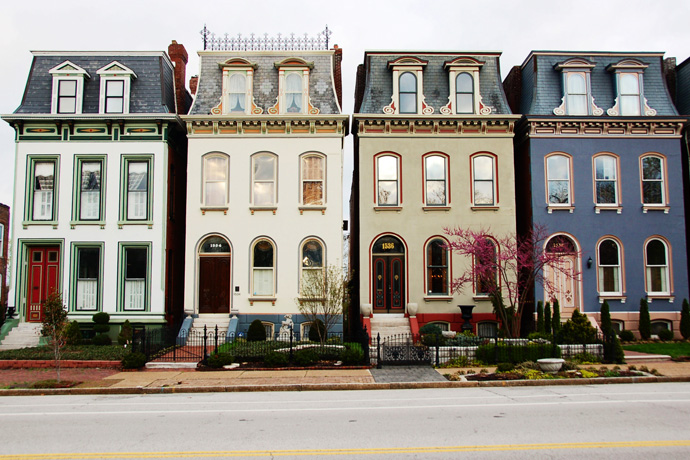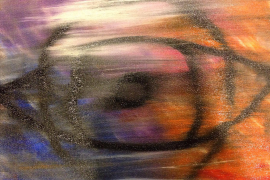One of my oldest friends, Caroline, whom I have known since I was a teen, lives in a neighborhood built in the 1920’s. All the houses are right next to each other so that each house abuts closely to its next door neighbor. Caroline lives in the middle of her block so she has a neighbor on each side. One house is neatly kept with a green lawn and manicured landscaping in the front and back and a perfect paint job. On weekends, Caroline’s neighbors can be found weeding their yard and usually gives me a warm hello as I walk up Caroline’s steps. The other neighbor’s house is likely occupied by renters, the yard is full of weeds and there are multiple cars parked on the sidewalk. A couple of times I’ve seen a guy out front, lying under his car to change the oil in his driveway. Due to the close proximity of the houses, Caroline can frequently hear what’s going on inside her neighbors’ house. It’s not uncommon for Caroline to hear her neighbors’ late-night trips to the bathroom, the telephone ringing, answering machine recordings etc.
Lots of people live in close quarters in urban areas and we adapt to our level of privacy and adjust accordingly. So it wasn’t surprising for me to learn that Caroline and her downstairs tenant were discussing the fact that their next door neighbors were engaged in a loud argument the night before. I didn’t think much of it. After all, this sort of thing happens all the time, people find themselves in a disagreement and the yelling starts. Over time, it became an ever-increasing topic of conversation between Caroline and her tenant, who was beginning to feel very uncomfortable with the escalating arguments. It was becoming fairly obvious that the verbal arguments had devolved into verbal abuse and were sadly becoming violent. There was a lot of hand-wringing. Should we have called the police last night? What if someone were to be seriously injured or worse? Domestic violence is a complex issue and most people are loath to get involved. Caroline was understandably conflicted.
This went on for months. Every few weeks or so I’d hear about another sleepless night due to the arguing and fighting going on next door. One evening I went over to Caroline’s for a visit to see a police cruiser, lights on and flashing, parked in front of the house with the neat yard and perfect landscaping. I went inside and asked Caroline what was all the drama about out front. “I guess someone finally called the cops” she replied. “Finally called the cops? What do you mean?” You see, I was stunned. Of all the conversations we had about Caroline’s neighbors, over all the many months this was going on, it never occurred to me that the neighbor she was referring to the whole time was her neighbors with the perfect house. I had assumed, without even thinking to clarify which neighbor we were discussing – there were two next door neighbors after all- that the domestic violence was occurring at the house with the shabby appearance. How could I be so prejudiced? I pride myself on being an open-minded person who errs on the side of compassion and giving the benefit of the doubt whenever possible. I was horrified when I realized that I made the assumption about the character of Caroline’s neighbors based on how their houses looked. Worse, I hadn’t even given it any thought at all, it simply never occurred to me to think past my assumption.
I believe that we are each the product of our own belief system. Indeed Jung said, “…man is so imprisoned in his type of thinking that he is simply incapable of fully understanding another standpoint.” As a certified coach, I felt pretty confident in my training and believed myself able to step outside my box and see another’s point of view, that I could suspend my judgment at will for the purposes of, not only my coaching work but for my own learning and enrichment. Seeing the police cruiser on Caroline’s block that night was a wake-up call for me. What other unconscious assumptions do I hold? How do I identify them if I’m not even aware of them? And most important, how are these assumptions shaping who I am, how I show up in the world and what I believe is possible?
Now, these aren’t new questions to be asking myself. I have asked these questions many times before. I’ve meditated, engaged in a regular yoga practice and spent hundreds of hours in coaching training and coaching sessions with clients. Asking myself these questions with the new knowledge of how unaware I can still be was both frightening and liberating. Frightening because plumbing the depths of our judgments and their associated assumptions often reveals a not-so-pretty picture. Liberating because I know that I am free from that old assumption, that awareness opens doors. In my coaching practice, we say with awareness comes choice. The deeper our awareness is the more choices we have in how to be at any given moment. And that’s a beautiful thing.





